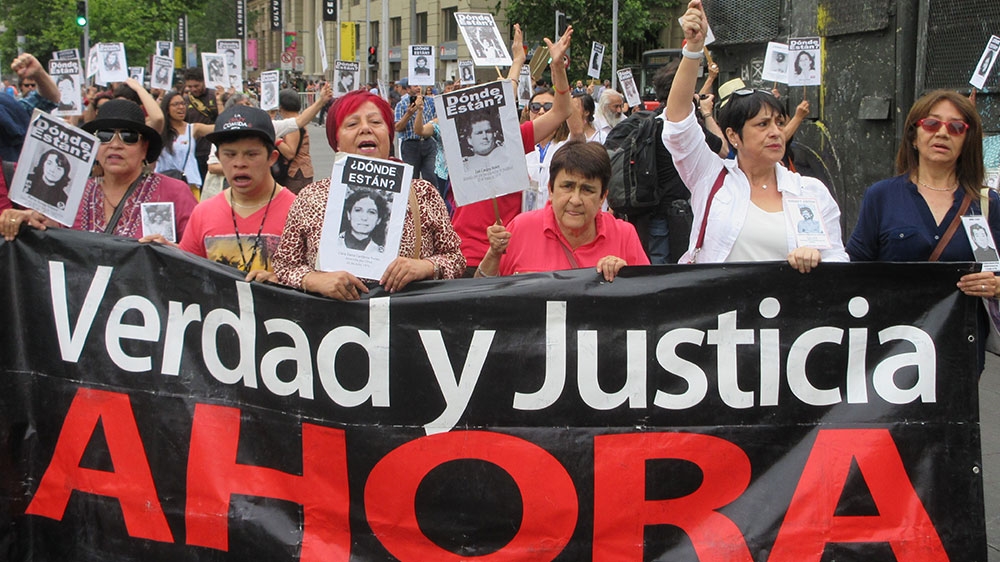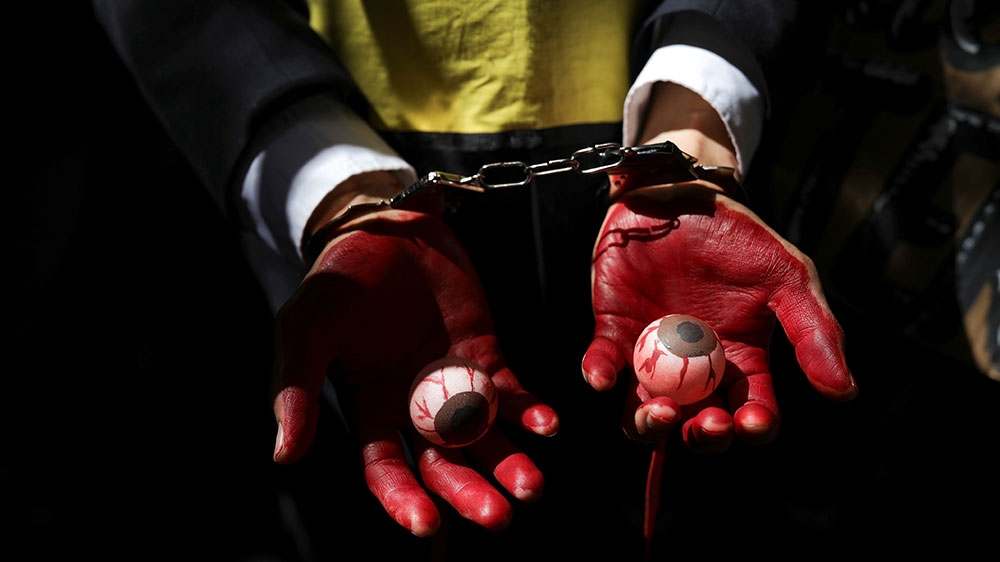World Human Rights Day: Chileans mark day with protests
Demonstrators accuse gov’t, military, police of carrying out grave rights abuses during nearly two months of protests.

Antofagasta, Chile – The military loaded people onto boats and some were never seen again. It happened 46 years ago, but it is something Carlos Martinez will never forget.
“Everyone saw what was happening,” he told Al Jazeera.
Keep reading
list of 3 itemsLaurin
Chile opposition files ‘constitutional accusation’ against Pinera
A food vendor in his 60s, Martinez now lives in Antofagasta, in northern Chile. But in 1973, he lived 1,360km (845 miles) south in Valparaiso. General Augusto Pinochet seized power in a military coup that year, and the dictatorship appropriated boats in the Valparaiso harbour to use as detention and torture centre for political prisoners.
“People from all over were tortured,” said Martinez. “Others were weighted and dumped into the sea.”
Thousands of Chileans were executed, forcibly disappeared, tortured and imprisoned for political reasons during the 17-year dictatorship. Martinez sees echoes of the past in current President Sebastian Pinera.
“He continues the repressive stance of the dictatorship,” he said.

Pinochet died at age 91 under house arrest 13 years ago on December 10, International Human Rights Day. The day commemorates the United Nations adoption in 1948 of the Universal Declaration of Human Rights, but many Chileans are marking the day this year not with celebrations but with protests.
Demonstrations against structural inequality are in their eighth week in Chile, and crackdowns by security forces continue to draw criticism.
Pinera gave a speech for Human Rights Day, saying “over the past 52 days, we have been made aware of many cases and reports of human rights abuses, and each and every one hurts us.”
Secondary student protests in October sparked nationwide protests for systemic change, and political and economic measures announced by the government have so far failed to quell the movement. Following an initial nine-day state of emergency that entailed military deployment, police have continued to crack down on daily protest actions around the country.
Pinera faces allegations of rights abuses
At least 24 people have been killed during the crisis, including five by military and police forces.
The National Human Rights Institute, an autonomous state body, has documented 192 cases of sexual violence by authorities and 405 cases of torture or other cruel treatment. The institute has also visited 3,449 people hospitalised for injuries, including 352 eye injuries, most of them caused by projectiles fired by police.
In his speech Tuesday, Pinera recognised the hard work in recent weeks by the 10-year-old National Human Rights Institute. It has facilitated greater awareness and increased capacity to identify and if necessary also punish all human rights violations, he said.
“Chile has a beautiful, noble and recognised tradition with regard to the protection of human rights,” said Pinera, pledging commitment to truth, justice, and assistance for victims.
But Pinera himself could face consequences for alleged human rights violations during the continuing crisis. Legislators this week are deliberating constitutional accusations against the president and Andres Chadwick, Minister of the Interior and Security at the outset of the crisis.

The Senate is scheduled to vote on Wednesday on the accusation against Chadwick, after it passed a vote by legislators of the lower house of Chile’s bicameral congress. Chadwick was removed in a cabinet shuffle, but would be barred from holding any public office for five years if the Senate votes against him.
On Thursday, legislators from the lower house will debate and potentially vote on the constitutional accusation against Pinera. In the unlikely event the accusation were to pass both in the Chamber of Deputies and Senate, Pinera would be immediately removed from office and barred from holding any other for five years.
International human rights NGOs Amnesty International and Human Rights Watch both published reports last month condemning police and military repression of protests. The government strongly repudiated allegations of intentional harm and indiscriminate attacks.
A team from the Office of the UN High Commissioner on Human Rights spent three weeks in Chile last month, documenting the situation. Their report is almost set to be released, high commissioner Michelle Bachelet said Monday. Bachelet served two nonconsecutive terms as president of Chile, both times followed by Pinera.
“We are the United Nations. We are not an NGO. It is just about to be presented to the government of Chile so that it can be known by everyone,” she said when confronted about the report by Chileans attending the COP25 climate conference in Madrid.

International human rights bodies have left the country, but alleged human rights violations continue. In a presentation to the Senate human rights commission Monday, the National Doctors Association of Chile reported multiple cases of severe burns from unknown chemical agents added by police to water cannon used on protesters.
In spite of the abuses, protests continue. Martinez supports them, and he is far from alone. More than two-thirds of Chileans think protests should continue, according to a recent poll by a trusted marketing and polling company.
“The new generations have woken up,” said Martinez. “The atomic bomb of youth has been exposed.”